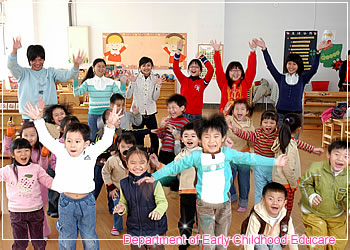Fax: 886-5-226-0293
E-Mail: ce@wfu.edu.tw
In line with the national childhood educare policies, the major objectives of the Department of Early Childhood Educare (DOECE) are to foster excellent childcare and educare professionalism for our current students. In addition to cultivating professional childcare knowledge and ethics, this department also strengthens students’ capabilities in not only information management but also English teaching.
The early childhood educare program is characterized by the following features:
- Few required courses. Students have a wide range of choices in selecting courses.
- A set of comprehensive professional curriculum. This program offers students both foundational and core courses.
- An emphasis on the combination of both theory and practice. Students have a great many opportunities to practice skills in childhood educare in the specially constructed classroom environment. Besides, students are eligible to take the practicum course to connect with day-care centers and kindergartens.
- Cultivation of professional childcare personnel. The dedication is to cultivate capable and highly-qualified students to serve in childcare-related industries.
The teaching team of DOECE is comprised of three associate professors, four assistant professors faculty members from the Department of Applied Foreign Language and the Department of Information Management. In addition, DOECE also plans to recruit more professional and experienced faculty members who holds Ph.D. degrees in early childhood educare.
Courses provided by this program are illustrated as follow:
- Core subjects include both common courses and general education courses.
- Mandatory courses include professional foundation, core and practicum courses.
- Module Courses include Curriculum and Instruction, Early Childhood Care, Information and Multimedia, Instruction of Children in English, or Early Childhood Special Education. Students can choose any of the module courses.
In order to fully develop students’ competence in educating young children, the DOECE has several classrooms specifically designed for training students’ in using various instructional methods and strategies.These specially-constructed classrooms include:
- Curriculum Modeling Classroom
- Movement Classroom
- Drama Studio
- Keyboard Studio
- Creative Art Classroom
- Sensory Integration Lab
- Ceramics Classroom
- Percussion Studio
- Percussion Preparation Studio
- Performing Hall
- Family Day Care Center
- Infant and Child Health Care Center
- Children’s Picture Book Creation Room
- Career Planning
Graduates of DOECE may develop their careers from three approaches:
- Applying for jobs: Graduates of DOECE are qualified to be teachers, staff members or directors of child care-related institutions.
- Taking National Examinations: Graduates of DOECE can take different kinds of examinations including the National General Examination, advanced and special exams for government officials of childcare, child-welfare, social work, administration of special education, and general educational administration.
- Pursuing advanced studies: Graduates of DOECE may also consider further studies. They can choose to study early childhood educare, early childhood education, special education, child welfare, counseling, psychology, home economics and family education.
- Instructors are all professionals who actively participate in practical projects, sharing their practical experiences with students.
- Instructors’ outstanding research projects closely relate to practice of early childhood education and childcare at high quality kindergartens and nursery schools.
- Instructors are encouraged to develop their second expertise and enhance their practical abilities through collaborative action research.
- Instructors participate in numerous government projects covering a wide variety of research topics.
- Senior professors in our department bring their leadership functions into full play, guiding junior instructors to take part in teamwork research projects.


